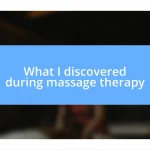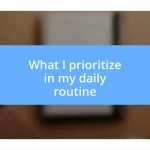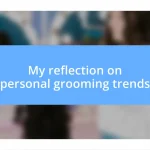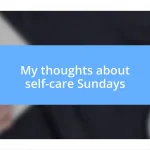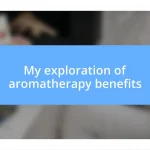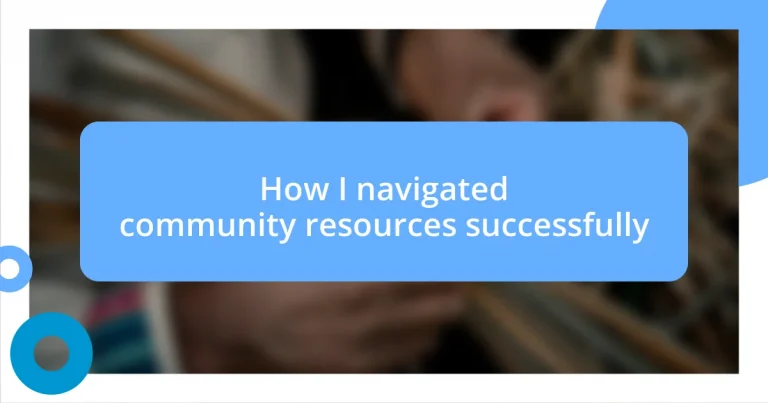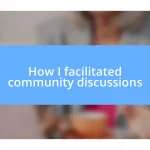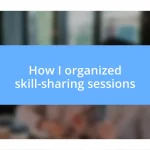Key takeaways:
- Identifying personal needs and fostering community relationships are crucial for effectively navigating and utilizing available resources.
- Researching local organizations through various platforms enhances awareness of community support options and facilitates networking opportunities.
- Evaluating the effectiveness of resources and sharing feedback with others enriches the experience and helps maximize community engagement and personal growth.
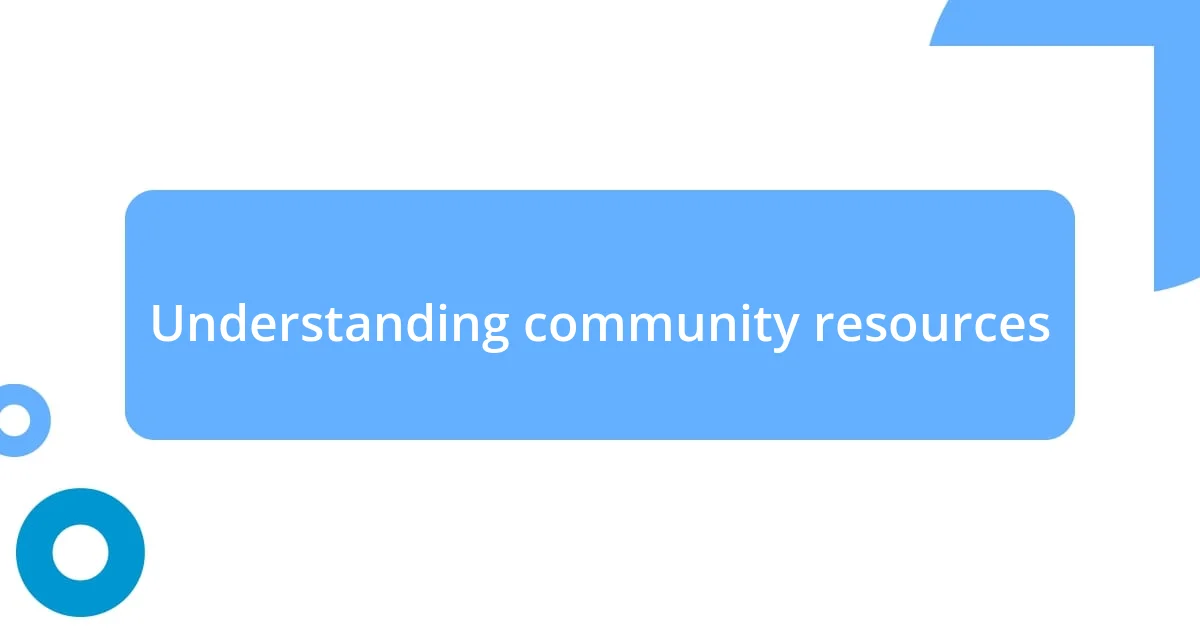
Understanding community resources
Understanding community resources is like discovering hidden treasures in your neighborhood. I remember the first time I stumbled upon a community center down the street; it was a little gem offering art classes, food banks, and even job assistance. Have you ever found a place that completely changed your perspective on what your community can offer?
Community resources come in various forms, from libraries to social services, each playing a vital role in supporting individuals and families. One time, when I was feeling overwhelmed, I reached out to a local support group I found at my library. It was amazing how sharing experiences with others lifted my spirits; it truly highlighted the power of connection and support within our communities.
Understanding these resources isn’t just about knowing what’s available; it’s about fostering relationships and building networks. Think about it: when was the last time you sought help or advice from someone in your community? I found that my willingness to engage opened doors to opportunities I never knew existed, proving that sometimes, the best resources are not just the physical spaces, but also the people who inhabit them.
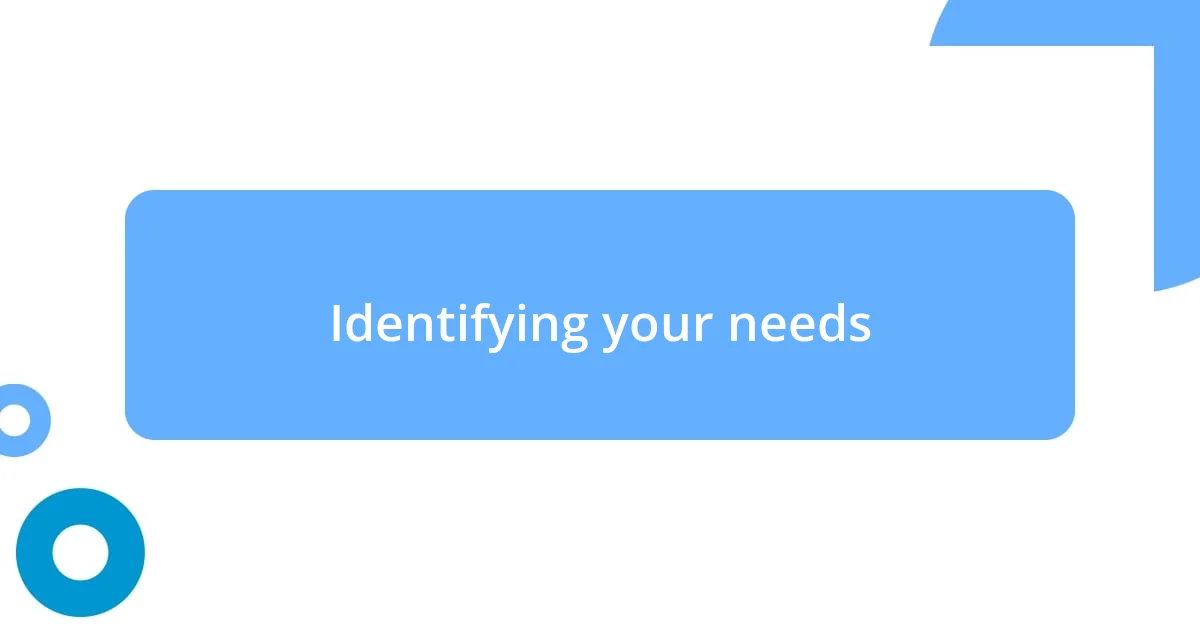
Identifying your needs
Identifying your needs is the first step toward utilizing community resources effectively. I remember sitting down one rainy afternoon, feeling a mix of anxiety and confusion about my life’s direction. It struck me that I needed clarity—was it emotional support, job opportunities, or perhaps something creative to reignite my passion? This moment of reflection helped me pinpoint what I truly sought, setting the stage for successful navigation of available resources.
To help clarify your own needs, consider these questions:
- What challenges am I currently facing?
- Are there specific skills or knowledge I want to develop?
- Is there support I need for my mental or emotional well-being?
- Am I looking for social connections or activities to engage in?
- What resources am I aware of that could address these needs?
Exploring these prompts can guide you toward a focused approach, making it easier to discover the right community resources that can genuinely support your journey.
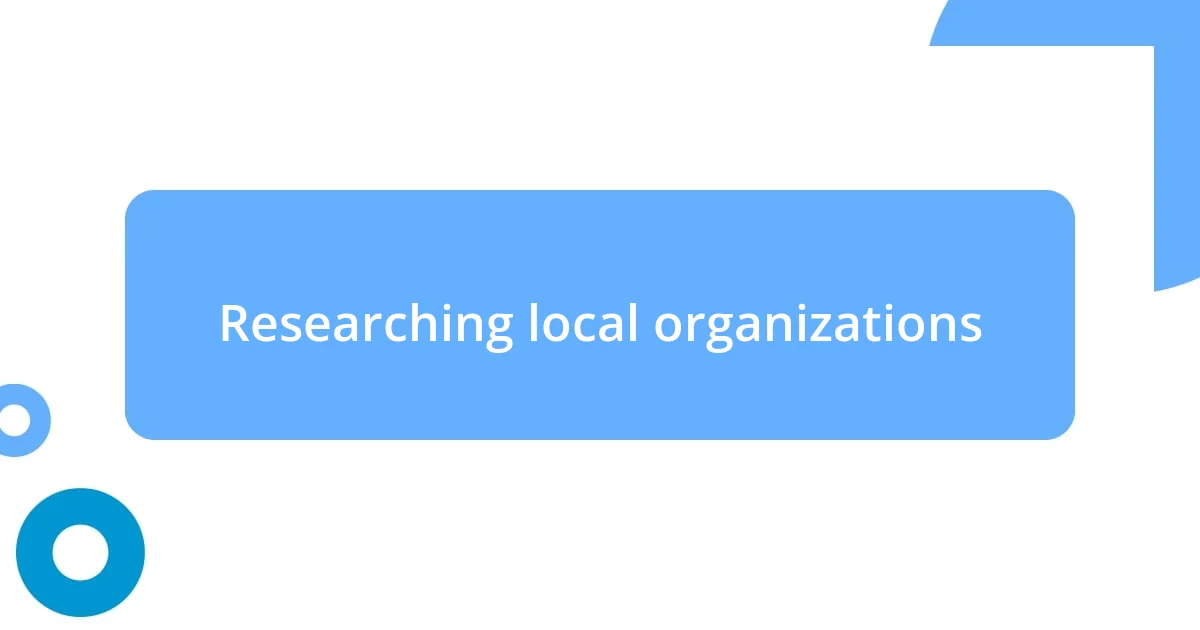
Researching local organizations
Researching local organizations can be both a rewarding and eye-opening experience. I remember the first time I started browsing online for resources in my community. It opened my eyes to a wealth of organizations that I had previously overlooked. I found everything from food pantries to youth mentorship programs. Just that realization made me feel more connected to my community and empowered to reach out for help.
When diving into research, I suggest tapping into multiple sources. Websites for local governments, community bulletins, and social media groups can provide a strong starting point. I often found hidden gems—organizations that weren’t heavily marketed but offered incredible support. By reading reviews or testimonials, I could gauge how others experienced these resources, ensuring I chose the best fit for my needs.
Getting involved with local organizations often leads to networking opportunities that are equally valuable. I recall attending an open house for a community arts initiative. The connections I made there not only helped me find resources but also introduced me to people who shared my interests and passions. These interactions enriched my life and made the search for community support feel less like a task and more like a journey of discovery.
| Research Method | Advantages |
|---|---|
| Online Research | Quick access to information; can find reviews and recommendations |
| Community Bulletin Boards | Discover local events and lesser-known organizations directly |
| Social Media | Engagement with local groups and real-time updates on opportunities |
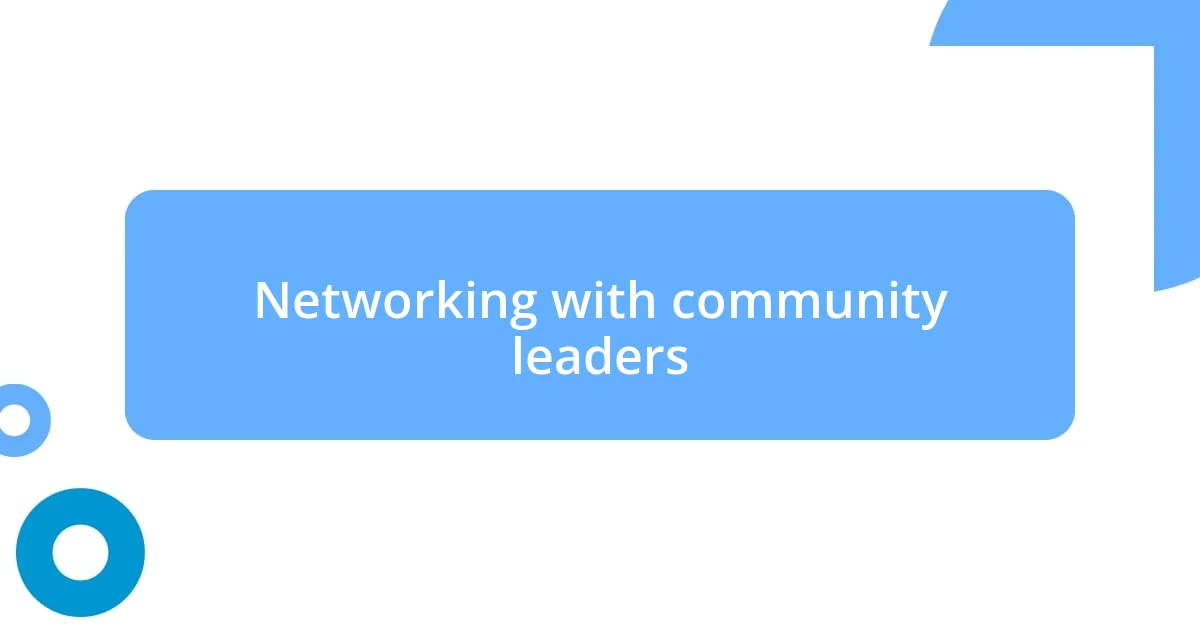
Networking with community leaders
Networking with community leaders opened doors I couldn’t even imagine. I remember attending a local city council meeting, feeling a bit out of place at first. However, as I listened to the discussions, I began to see the vital role these leaders played in shaping our community. It was inspiring to realize that many of them genuinely wanted to help—if only I could show them my goals and passions.
A key takeaway from my experience is the importance of approaching these leaders with openness and authenticity. At a community forum, I struck up a conversation with a neighborhood association president. I shared my struggles regarding access to resources for creative projects, and to my surprise, she connected me with an arts grant program that had transformed her initiatives. It highlighted how sharing my story not only created a connection but also led to practical support.
I often wonder how many people miss out on opportunities because they hesitate to engage. The truth is, most community leaders are not just authoritative figures but are eager to help. After establishing a rapport, they can offer advice, mentorship, or even collaborate on initiatives. I distinctly remember feeling a wave of excitement as I left that meeting, knowing I had taken a significant step toward building my network and enhancing my community engagement.
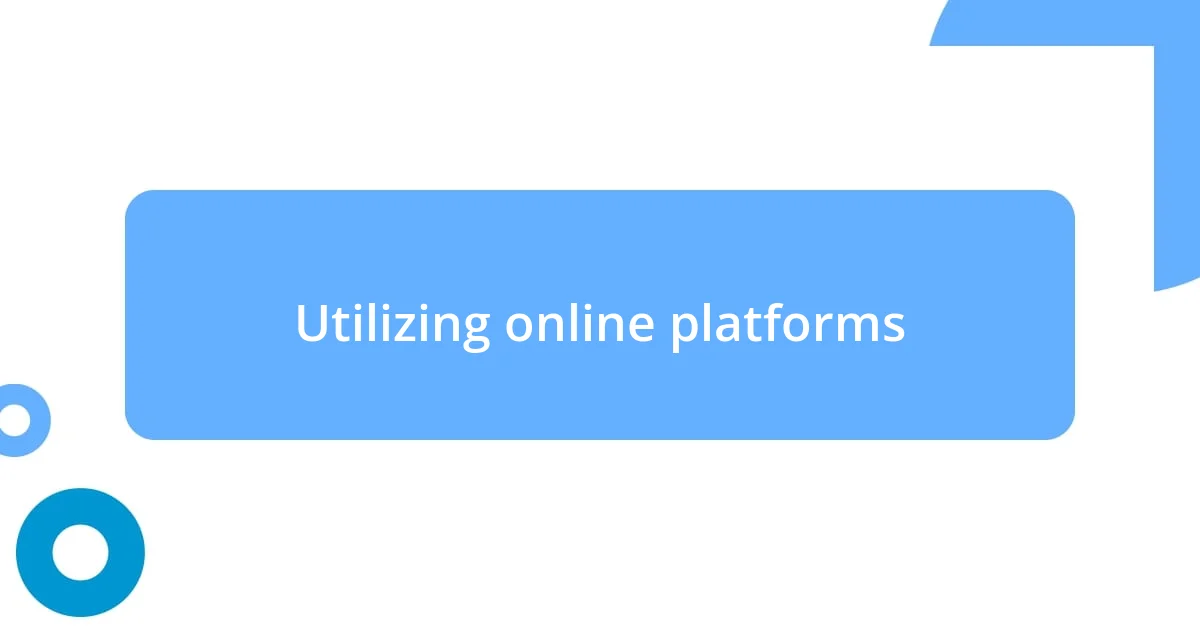
Utilizing online platforms
Utilizing online platforms has been a game changer for me when seeking community resources. I often turned to Facebook groups dedicated to local issues, and I remember the first time I posted a question about access to wellness programs. The flood of supportive comments and suggestions was overwhelming; it felt like I had tapped into a hidden network ready to help. Have you ever felt the power of community support at your fingertips? It truly changes everything.
I also found that websites like Nextdoor are invaluable, offering not just recommendations but also urgent updates about local events or services. There was this one time a neighbor shared an urgent call for volunteers to help at a food drive, and I jumped in. It wasn’t just about helping others; it became a profound moment of connection. I made new friends, learned about their stories, and felt a sense of belonging I hadn’t anticipated.
Additionally, while researching resources online, I stumbled upon local blogs that highlighted personal journeys with specific organizations. One woman wrote movingly about her experience with a mentorship program, and her words resonated deeply with me. It made me reflect on my own life choices—how sharing our narratives online can build bridges and foster connections. Have you ever felt compelled to share your story after reading someone else’s? It’s incredible how these digital platforms can inspire us to reach out, connect, and ultimately benefit from the resources available in our communities.
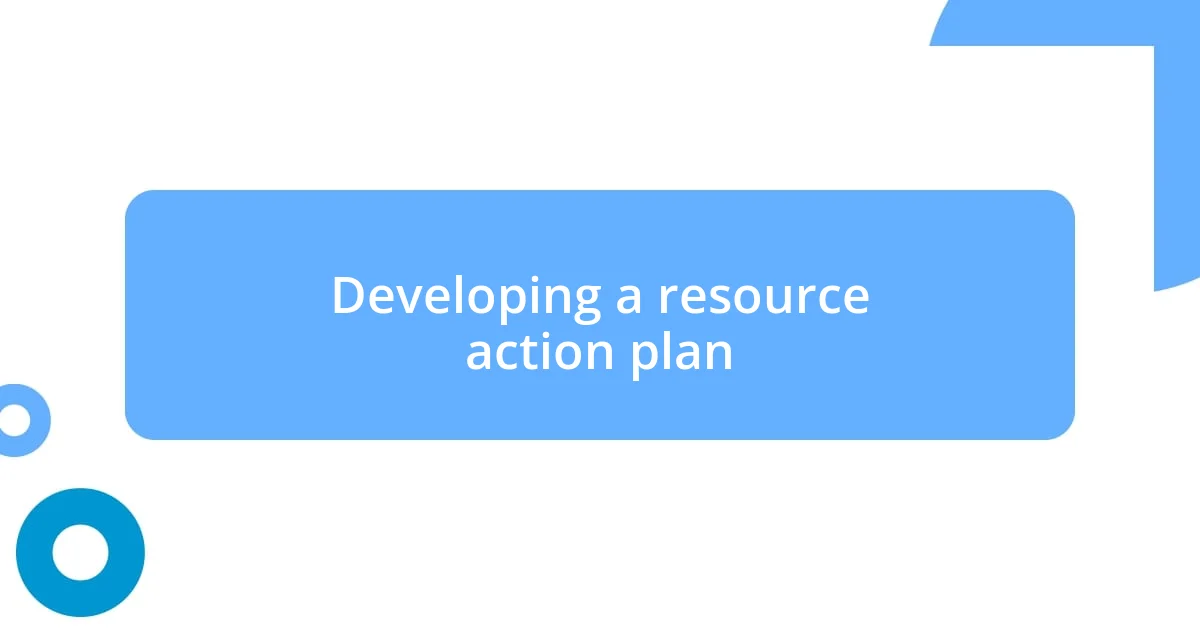
Developing a resource action plan
Creating a resource action plan was vital in my journey to harness community resources effectively. I learned that setting clear, achievable goals helped me navigate the wide array of options available. For instance, when I wanted to start a community garden, I took the time to outline what I needed—land, volunteers, and funding—and developed a simple timeline to meet each objective. Have you ever realized how much clarity can guide your steps?
As I fleshed out my plan, I made sure to incorporate feedback from community members during a brainstorming session at a local café. The warm buzz of conversation filled the room, and I remember feeling a rush of inspiration as ideas bounced around like confetti. Listening to the insights of others not only improved the action plan but also fostered a genuine sense of teamwork, which I realized was crucial. Engaging others in this way made me feel more committed and less isolated in my efforts.
One pivotal moment in executing my action plan came when I secured a meeting with a local business for sponsorship. I approached it with excitement and a clear proposal in hand, detailing what we could achieve together. The business owner was intrigued, especially since we could spotlight their brand while making a positive impact on the community. It struck me then: developing a resource action plan isn’t just about logistical steps; it’s about building relationships that empower both you and those around you. How often do we overlook the power of collaboration in our individual pursuits?
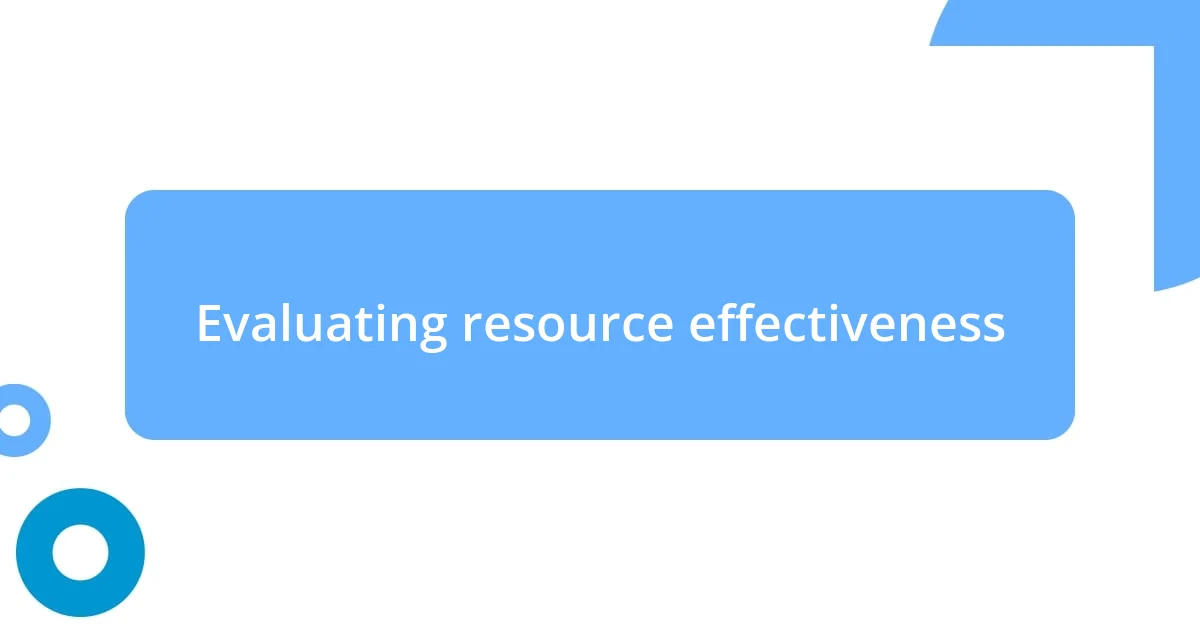
Evaluating resource effectiveness
Evaluating the effectiveness of community resources became a crucial step in my journey. After getting involved with different organizations, I started keeping a simple journal, noting what worked and what didn’t. I vividly recall attending a workshop that promised transformative skills but ended up being a series of dry presentations. Have you ever felt your time was wasted like that? It fueled my determination to dig deeper into evaluations and seek out feedback from others in the group.
I began to create a mental checklist for assessing these resources. Was the information clear and actionable? How engaged did I feel during the sessions? I remember one mentor who genuinely connected with participants, effortlessly weaving personal stories into the learning process—it made me excited to return. In contrast, other sessions left me feeling drained. It’s amazing how a welcoming atmosphere can transform a mundane experience into something memorable.
Gradually, I started sharing these evaluations with friends who were navigating similar spaces. I asked them to reflect on their experiences, and together, we formed a mini think tank. This collective feedback loop not only improved our choices but also strengthened our friendships. Are we really making the most of our community opportunities if we aren’t sharing what we learn? Engaging in this evaluative dialogue made the journey not only more effective but also undeniably more rewarding.
